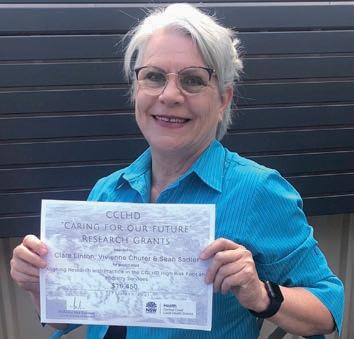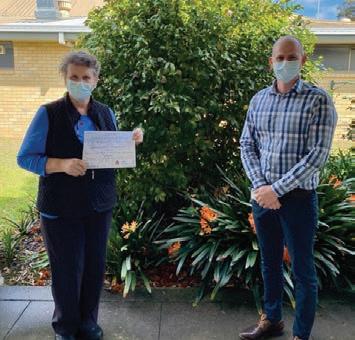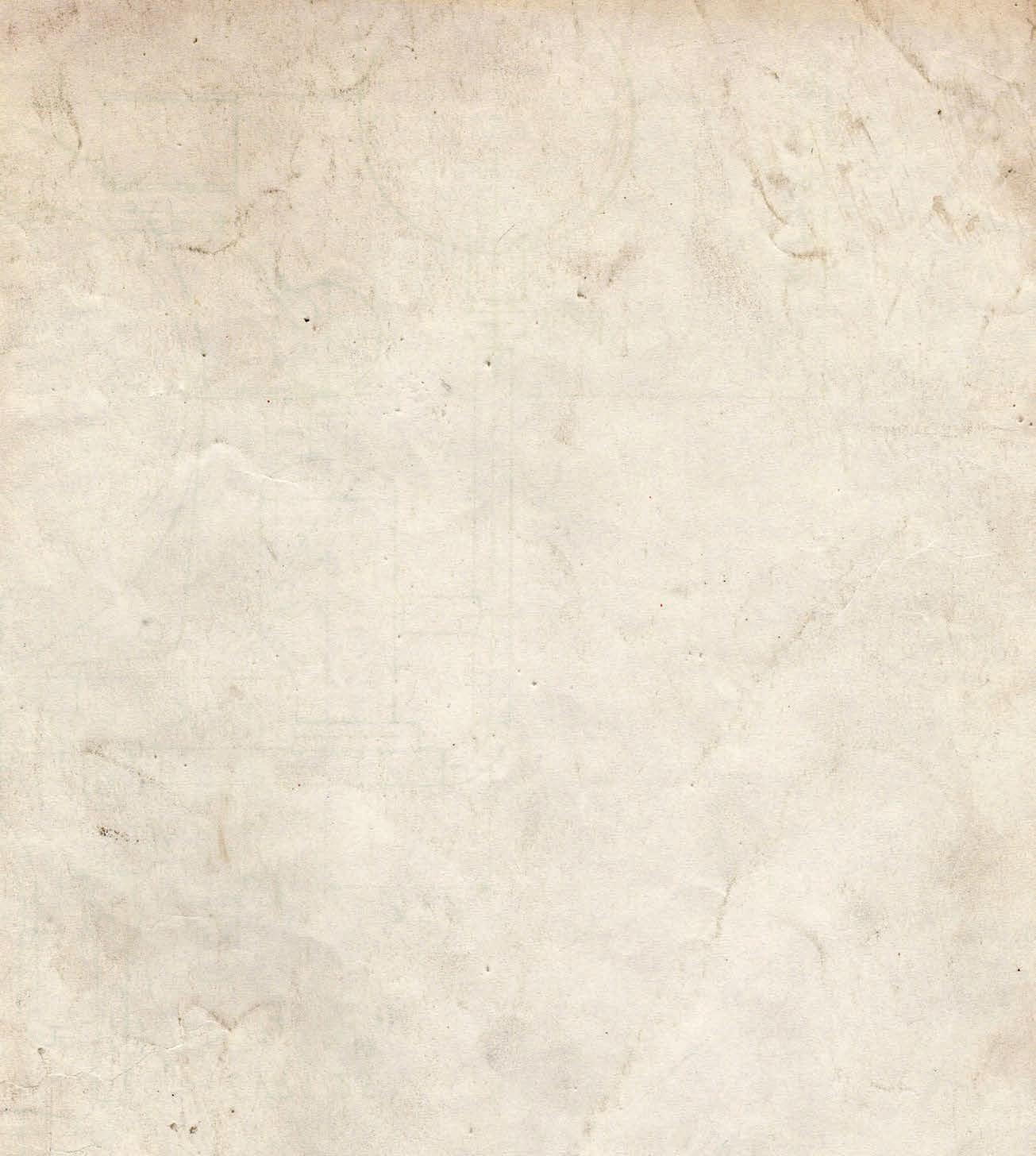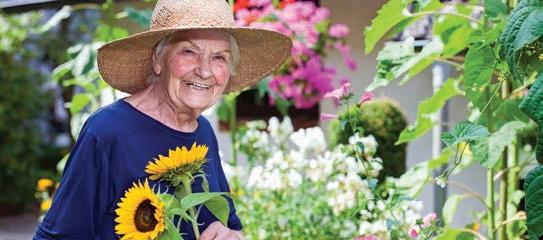
12 minute read
Matters of Life & Love
Matters of life & love BY SARAH TOLMIE
READER QUESTION: “My dog died. He was my constant companion these last 17 years on my own. I have had many griefs in my life. I lost my husband 15 years ago. My brother only 2 months ago. I feel overwhelmed by the grief and the tears just come and don’t seem to stop. This grief seems so different. I feel shocked I feel it so strongly.”
Dearly Beloved
Every dog loving human will understand your pain and sorrow. There is no need to feel embarrassed or ashamed at the uncontrollable outpour. It is natural. It is necessary. It is beautiful.
There is a special undiluted, unconditional love we reserve for our pets. They place no conditions on us. Our relationship agreement is totally simple. They get to be the dog and we are the human who does everything for them. The love flows purely, unmitigated by expectations, disappointments and misunderstandings. Dog and human become a single unit in many ways because their existence depends entirely on us – food & water, shelter & love – and we happily orient our lives around them because the payback is simple love. It’s a truly wondrous evolving of nature that an animal has become so domesticated and part of our pack. Dogs have behaviourally evolved to appeal to us through love. They are the ultimate Masters of Love.
And as such, no wonder they take on the role as ‘best friend’, ‘fur children’ and more. These monikers are not just playful names, they are real. We tell our dogs our fears and secrets; they lean into us when we are sad and alone; they bookend our morning awakenings and night time completings. They can be our most intimate companions.
I wonder if you can try to look at the grief that you are feeling and cannot help but express as a real privilege and honour. A ‘peak experience’ in life & love even! The pureness of your grief, uncomplicated, untainted, is like being pierced in the heart by a light laser of pure love energy. It is a ‘thoroughbred’ feeling so intense – so painful, because the love was so beautiful and real. Do not be afraid of this feeling, as intense as it is. It is one of life’s pinnacle achievements, to have experienced such real, authentic and simple love. You have been blessed.
Lean into the feeling when you can. Those moments alone when you can freely surrender to your tears, cry dear one, cry. Do it 100%. Those tears cannot hurt you more and instead, they will help in time to allow the sharp pain to soften and gentle. I PROMISE, when you allow your sadness to have its time, it will not overstay its welcome. Sadness and Happiness live together. Sadness is the essential doorway you must walk through to know happiness. Create an altar for your beloved pooch. Give thanks for the love, companionship and good times. Cry when you need to and I PROMISE your heart will one day again relax and exhale fully and smile at the memories when you think of your beloved dog.
Much love Sarah x
Sarah Tolmie – Life & Love: Sarah is a marriage therapist, life & love and relationship coach, end–of–life consultant, an independent and bespoke funeral director and holistic celebrant. She provides holistic care, mentoring, guidance, healing and transformation for individuals, couples and families at their most important times of life & love – at end–of–life, in love & relationship, and in ritual and celebration. Sarah has a relationship online course for couples called “Creating a Miracle Marriage” and a free resource and video series for families facing dying, death and grief called “Landscapes of Life & Love and Loss”. To find out more, visit www.sarahtolmie.com.au.
Research grants will help care for our future
A pilot program supporting self administration of chemotherapy at home is among seven research projects to receive funding under the 2021 Central Coast Local Health District (CCLHD) Caring for our Future Research Grants.
The innovative projects have been awarded grants, totalling $127,005 in funding. The grants enable CCLHD staff and students to undertake research that will deliver long term benefits to patients and the community.
Jacqui Jagger (Cancer Services) and Michael Swab (Pharmacy Department) are receiving a grant to pilot and evaluate a new model of care for eligible myeloma patients using self–administration of chemotherapy at home.
Jacqui Jagger said her research grant would help “give back a bit of control” to cancer patients.
“This grant will help us provide better support for cancer patients in a number of ways,” Jacqui said. “Firstly, by removing the need to make regular, sometimes twice a week, visits to hospital, it gives them more time to do the things they want to do. This also helps the patient’s family, who often have to provide transport.
“Myeloma is particularly difficult in that its chronic nature means people are more often on treatment than they are not. This grant will help keep a group of patients particularly susceptible to infections out of hospital, yet in active treatment from the comfort of their own home.
“It will also enable us to develop robust telehealth services that relieve some of the pressure on our Cancer Services teams, providing sustainable benefits to District staff and patients alike.”
Research into mental health support for First Nations pregnant women and mothers has also received a funding boost. Melissa Stephens (Ngiyang Aboriginal Pregnancy Child & Family Health Service) and Leanne Roberts (Women, Children and Families) have been granted funds to improve anxiety and depression screening for First Nations pregnant women and mothers of children up to six years old. The research will develop an improved and culturally appropriate tool that allows for a comprehensive mental health assessment of pregnant Aboriginal women and mothers.

Other recipients include: Jonathan Brinton and Dr Anne
Purcell (Community Nursing Service)
who receive funds to evaluate the impact of CCLHD Communication
Nursing Service’s Specialist Wound
Centre model of care, introduced in 2019, on improving wound healing rates and patient experiences, along with economic efficiencies. Cheryl Travers and Andrew Dixon (Public Health Unit) are awarded a grant to explore the factors that affect healthcare workers’ ability and willingness to work during natural disasters and extreme weather events. Dr Anna Schutz (Neurology
Department) and Dr Karen
Hutchinson (Australian Institute of Health Innovation, Macquarie
University) receive funding to assess the impact of a community based multidisciplinary motor neurone disease (MND) clinic, established in
February 2020 on the Central Coast, on improving quality of life and patient outcomes in a regional setting. Clare Linton (Podiatry Department),
along with the University of
Newcastle’s Professor Vivienne
Chuter and Dr Sean Sadler, has been
awarded a grant to help reduce the likelihood of people with diabetes developing ulcers or requiring amputation. Finally, Sim Galimam (Wyong
Pharmacy Department) and
Nicole Cerruto (Gosford Pharmacy
Department) receive funds to investigate whether Covid has affected the way patients with respiratory infections are treated empirically with antimicrobials. The research will involve a retrospective observational study comparing two randomised cohorts of patients, one with Covid and another with influenza, and will help formulate guidelines for future antimicrobial use during respiratory illness outbreaks like coronaviruses.

The Caring for our Future Research Grants support projects that generate preliminary data in order to attract further larger funding grants in the future, such as the Translational Research Grants Scheme (TRGS), National Health and Medical Research Council (NHMRC) grants or research fellowships.
Dr Katherine Bolton, Research Manager at CCLHD’s Research Office, congratulated the recipients.
“There were so many fantastic applications to choose from, but the quality of these projects really stood out in terms of the sustainable impact they will have. The research projects will go a long way to enhancing the way we deliver care so that we can achieve the very best outcomes for our patients and the wider community.”
Summer
Survival A GUIDE TO BEAT THE HEAT THIS SUMMER WITH HOT WEATHER TIPS FOR SENIORS

Australia is known as the ‘sun–burnt country’ and it’s incredible hot weather, with average temperatures soaring to 30 degrees during the summer months. However, despite the Aussie outdoor lifestyle being so loved and embraced, heat stress is the number one natural killer in our country.
As we get older our bodies find it increasingly difficult to regulate heat efficiently, therefore it’s extremely important for seniors to take extra
precaution when temperatures are high.
“We advise our clients to be heat smart by drinking small sips of water frequently, using air conditioning or opening up windows, and avoiding going out into the heat between 10am
and 4pm if possible. If you’re going All of our delicious soudoughs are made using pure, to enjoy a drink during hot weather, natural ingredients from certi ed organic farms. Our our matching each glass of alcohol with one or two glasses of water, is always a good plan.” says Jasmine Hopcraft, Owner and Director of Home Instead on the Central is milled using a slower, traditional stoneground method to avoid overheating and dehydration. This retains nutrients and wheat germ, giving that nutty avour. Coast and Newcastle.Our natural starter slowly ferments over 18 hours which
We have created a list of survival tips allows the dough to rise and the bene cial lactobacilli to ensure everyone enjoys the summer (which promotes gut health and helps digestion) to fully safely and avoids the dangers of Heat develop. This long fermentation produces that unique soudough Stress which can include dehydration, avour that can be obtained no other way. heat exhaustion, heat stroke, heat cramps, sunburns and can even cause death.
1 Hydration Dehydration is a common heat related condition which can be serious, even fatal. It is important to keep the body hydrated by regularly sipping on water throughout the day. Health authorities recommend a person should ideally drink two litres of water per day.
BEAT THE HEAT Summer Tips for Seniors
2 Stay Out of the Sun Although the beach is tempting on a hot summer’s day, you should avoid
All of our delicious sourdoughs are made using pure, natural ingredients from certified organic farms. Our flour is milled using a slower, traditional stoneground method to avoid overheating and dehydration. This retains nutrients and wheat germ, giving that nutty flavour. Our natural starter slowly ferments over 18 hours which allows the dough to rise and the beneficial lactobacilli (which promotes gut health and helps digestion) to fully develop. This long fermentation produces that unique sourdough flavour that can be obtained no other way.
FREE FROM
FREE FROM • arti cial preservatives • avourings and colouring • artificial preservatives • flavourings and colouring • no added yeast • no added sugar • no animal products • no nuts • no chemical herbicides & pesticides
• no added yeast • no added sugar • no animal products • no nuts • no chemical herbicides & pesticides


@BILLSORGANICS #BILLSORGANICS
• no animal products • no nuts sticides • no chemical herbicides & pe FREE FROMFREE
@BILLSORGANICSFOLLOW US ON FOLLOW US ON #BILLSORGANICSBILLSORGANICS.COM.AUBILLSORGANICS.COM.AU

direct sun exposure where you can, particularly seniors. Try to stay in cool, shaded, or breezy areas, take regular breaks from the sun and keep your home air conditioned. It is also important to remember heat stress can strike at any time, even cloudy days, so avoiding extremely warm environments is strongly advised.
3 Protective Clothing When planning a day in the sun, it is important to wear suitable clothing for the weather condition. If you are wearing full coverage clothing to protect your skin, avoid over heating by ensuring the material is lightweight and light coloured. Seniors’ eyes tend to be more sensitive to sunlight, therefore it is important to wear UV filtering sunglasses to avoid damage. And don’t forget your sun hat!
4 Sunscreen Please, please, please don’t leave the house without sunscreen. Sunscreen contains sun protection factors (SPF), which protects your skin from harmful UV rays and decreases your chance of sunburn and skin cancers. It is also a good idea to invest in a daily moisturiser with an SPF of at least 30+. 5 Be Activity Astute According to the Sun Safely Alliance the sun is at its strongest during the hours of 10am–4pm, so it is not a good idea to plan strenuous activities while the temperature and UV rays are soaring. Think up some fun activities to beat the heat during this time such as heading to an air conditioned shopping centre or gaining access to a swimming pool. Save the long walks for early mornings or evenings when the temperature has cooled down. If you are concerned for yourself or a loved one, please seek medical advice.
To us it’s Personal At Home Instead, we believe in a relationship based approach to care and support, as opposed to task based. We help with a range of personal and lifestyle needs while providing welcome companionship. Our services include assistance with personal care, light household duties, meal preparation, transport to appointments, shopping and social outings. We take personal responsibility for providing the best in–home care and support to meet our clients’ needs.
We employ and train our CAREGivers to understand the challenges facing people as they get older and provide specialised care through our unique training program to support our clients.
We understand that to you, it’s about finding trustworthy care for your ageing loved one. To us, it’s about providing the highest quality, in–home care services to fit you and your family’s needs.

5
For more information on services and support that is right for you and your family, please contact our local Home Instead office on 02 4342 3477 www.homeinstead.com.au
ABOUT HOME INSTEAD Established in 2013, Home Instead is a locally based in home care and companionship service on the Central Coast. We are committed to making a positive difference in the lives of local seniors and their families and we take pride in every aspect of their care to ensure they have access to the best quality care services and support they need to continue living, safely, independently, and happily in the comfort of their own home.
Will you have to sell the house?
Understand the financial implications and opportunities available when transitioning a loved one into Aged Care. We can guide you through the financial steps. Ask today!

Sophie Doyle AR 000470612 Aged Care Specialist / Associate Adviser
02 4325 0884 | morgans.com.au/gosford/aged-care
Morgans Financial Limited ABN 49 010 669 726 AFSL 235410 A Participant of ASX Group A Professional Partner of the Financial Planning Association of Australia.




